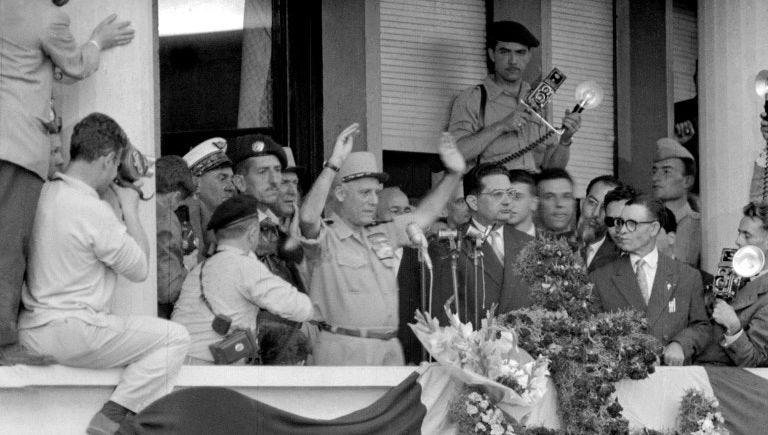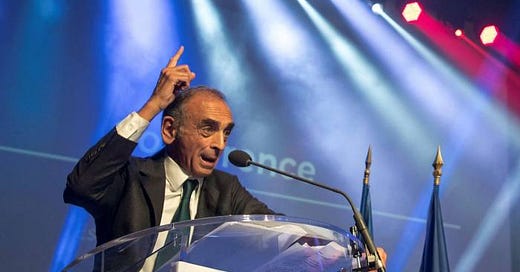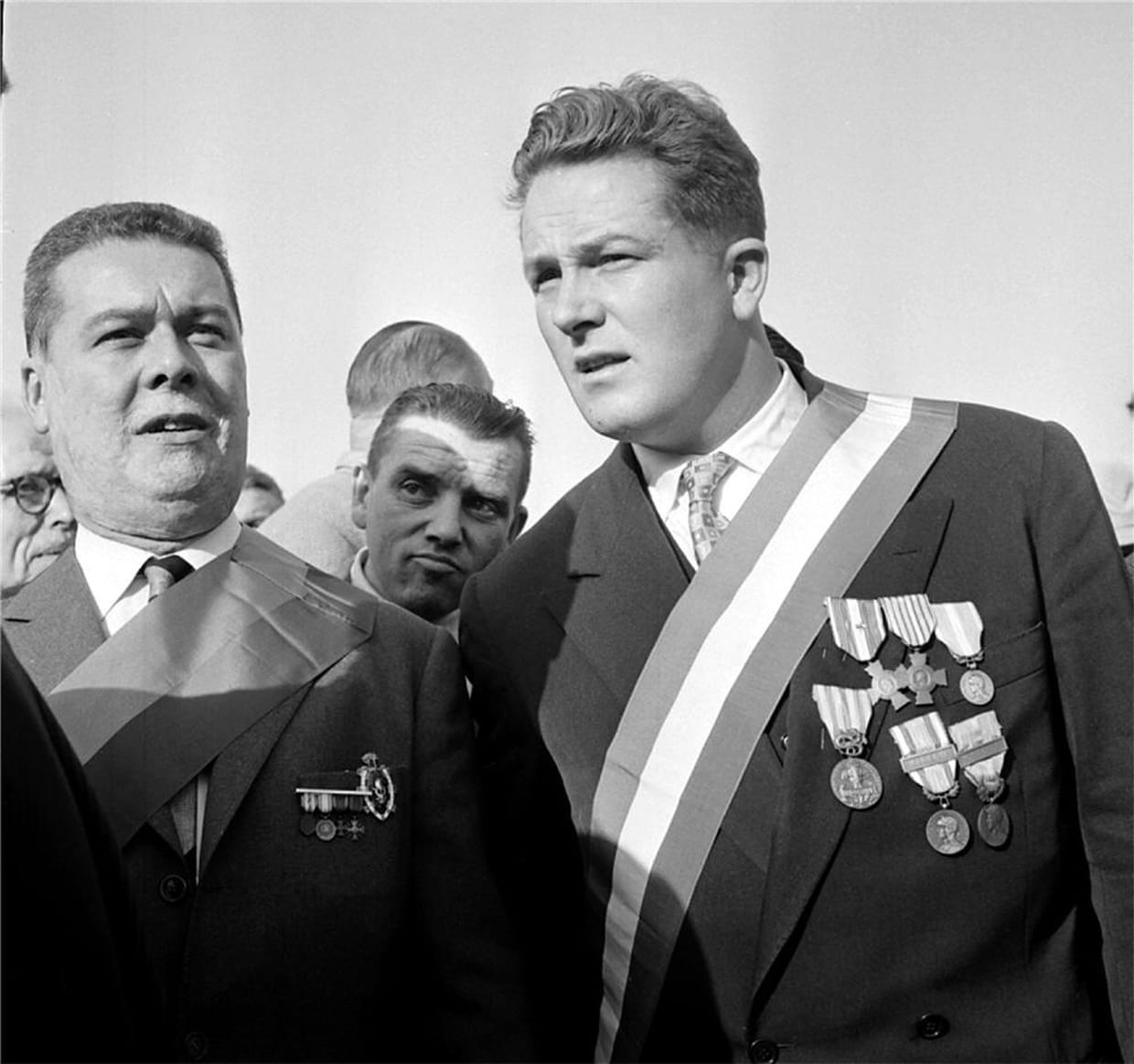Eric Zemmour and the long shadow of France's defeat in Algeria
LA CAMPAGNE NUMÉRO TROIS: 188 days until Macron's re-election.
In a speech over the weekend in Nîmes, in the South of France, great replacement propagandist and all-but-declared presidential candidate Éric Zemmour put forward his theory of the “strong” State, whose role is to “civilize the barbarians.”
That language is very explicitly the language of the colonizers of yore. Zemmour’s political programme is not just to secure the proverbial future for France’s white children (as goes the cursed slogan), but also to re-colonize France, as it were, and in particular its former colonial Muslim “minorities.” Zemmour and his supporters, whose numbers keep rising at an alarming rate, are haunted by the specter of France’s imperial past, those glorious days when, in Algeria and beyond, it was the conquering French State that was doing the replacement of the indigènes, at the point of the bayonet.
The demise of France’s colonial empire, its failed attempt at “great replacement” but abroad, casts a long shadow over our country’s politics. This is no mere atmospheric observation from 30,000 feet distance. Decolonization and the loss of Algeria, or rather its independence, are the crucible of the Fifth Republic. As I discussed in a previous post, the election of the president by popular vote and the debasement of the Parliament were aftershocks of the Algerian crisis. The nagging question of immigration is also a delayed effect of the defeat in Algeria. That is the only way to make sense of its persistence, as immigration in France is altogether limited (at 10.3% of immigrants, France lags the OECD average, well behind countries like Germany or Belgium or Canada.)
But the rot goes even deeper: De Gaulle came back to power in the spring of 1958 after a military coup in Algiers. At the time Algiers was the second largest French city after Paris! The military had taken over the colony’s capital because the government in Paris had fallen, and the soldiers on the ground were irate at the prospect of a new cabinet that could begin negotiations with Algerian independentists. Several close De Gaulle associates were among the coup organizers. De Gaulle kept them at arm's length but his fingers were all over this. General Salan, the leader of the coup, concluded his speech before the assembled crowd in Algiers with a sonorous “Vive De Gaulle!”

Once they had secured Algiers with the support of the colonists, the rebels sent paratroopers to land across the Mediterranean, in Corsica. The message was direct and ominous. Unless something changed, Paris would be next. René Coty, the ceremonial President, blinked and called De Gaulle to form a government, and threatened to resign if Parliament did not grant the General full special powers (“pouvoirs d'exception.”) With the very real menace of a paratroopers' assault on Paris, the army forced De Gaulle's return. And De Gaulle was rather eager to oblige.
Looking back on it, the whole chain of events, and above all De Gaulle's role in it, seem downright insane. And yet that is how the Fifth Republic was born, in a military coup orchestrated to keep Algeria French (that De Gaulle proceeded to betray those who had carried him back to power remains an unexamined contradiction for French right wing voters.)
The same lingering concerns, and the same cast of characters, has bedeviled French politics ever since. Take for instance young Deputy Jean Le Pen (who later took to calling himself Jean-Marie). Le Pen père began his storied political career and his dynasty in the midst of the Algerian War. In October 1956 the freshly elected member of Parliament was allowed to rejoin his old paratrooper unit to fight in the Battle of Algiers. He spent 6 months there as an intelligence officer, chasing and torturing alleged “terrorists.” This is not some scandalous secret, tough guy Lieutenant Le Pen bragged about it in the press at the time. After his tour in Algiers he came back to sit and agitate for the cause of Algérie Française in Parliament. He later went on to manage the 1965 presidential campaign of the anti-De Gaulle and staunch pro-Algérie Française candidate Jean-Louis Tixier-Vignancour.
Éric Zemmour himself is an Algerian Jew. While he was born in Montreuil near Paris in 1958, his parents had left Algeria during the War. One could even say that they emigrated, as they had to flee their ancestral home under duress, caught in a cruel and violent civil conflict. Unlike Muslims, the Jews native to Algeria had enjoyed full French citizenship since 1870 and minister Adolphe Crémieux’ decree. Algerian Jews, who had lived in North Africa since Antiquity and whose culture was a unique mélange of Arabic, Berber and Hebraic influences, suddenly became “civilized” overnight, by Republican fiat. They embraced their new status as an emancipation, and took on the role of France’s colonial administration’s most zealous adjuncts. France was their country of citizenship, but Algeria was their homeland. Zemmour’s revanchism, as well as his animosity towards Muslims in general, springs in part from that historical trauma: the defeat of France, the victory of the Muslim indigènes, and the subsequent uprooting of his family.
France never confronted, let alone alone digested, its colonial past and its defeat. The contradictions were never worked through, and De Gaulle put a lid on them by short-circuiting Parliament. The quasi-monarchical, soft caudillismo of the Fifth Republic, itself the constitutional result of a military coup d'état, could only stoke further the authoritarian fantasies of Zemmour and his ilk.
These contradictions and authoritarian impulses are still on full display nowadays. The politicians who keep promising to curb immigration to ward off some “great replacement” — La France aux Français! — also praise the benefits of colonization and the greatness of the French Empire.
During the 2017 campaign, the dour and witless François Fillon explained that colonization was a way to “share France’s culture.” In 2005, on his path to the presidency, Sarkozy promoted a law to teach the “blessings” (“bienfaits”) of colonization in schools. No later than last November, the current Prime Minister Jean Castex said this on TF1’s prime time newscast:
"Je veux ici dénoncer toutes les compromissions qu'il y a eues pendant trop d'années, les justifications à cet islamisme radical : nous devrions nous autoflageller, regretter la colonisation, je ne sais quoi encore…” (roughly: “I am here to denounce all the compromises that have taken place for too many years, the justifications for radical islamism, that we should self-flagellate and regret colonization…”
He was speaking in the wake of the heinous murder of a history teacher by a radicalized teenager from Chechnia. His dubious argument was that criticizing French colonization amounted to supporting ISIS terrorists, and sounded very much like a throwback to the turbulent days of the war in Algeria – when say, Communist militants were accused of aiding the FLN and on occasions were tortured and murdered by French troops. Anybody who dared question the Army or Algérie Française was branded a traitor or a terrorist. Nothing much has changed. At least for some.

To his honor and credit, Emmanuel Macron began the difficult process of truth and reconciliation. In 2017 he spoke of the “crimes against humanity” of colonization. And even as Zemmour was ranting about “civilizing the barbarians” Macron laid a wreath by the Pont de Bezons, to commemorate the anniversary of the June 17, 1961 massacre, when the Paris police killed an estimated 200 Algerian demonstrators and threw their bodies in the river Seine. An “unforgivable crime” for the République, the President called it. Zemmour retorted by accusing Macron of “rewriting the history of France, always to its detriment.”
The rewriting is long overdue. Who knows, it may even free all of us, including Éric Zemmour, from the noxious fetters of our past.
Today’s song is by oud virtuoso, Pied-Noir singer-songwriter and Algerian Jew Gaston Ghrenassia, better known as Enrico Macias. He came from a family of musicians from Constantine. He left Algeria in 1961, after Cheikh Raymond Leyris, his father-in-law and teacher of malouf (arabo-andalusian music) was assassinated by the FLN.
À la prochaine! — M.







